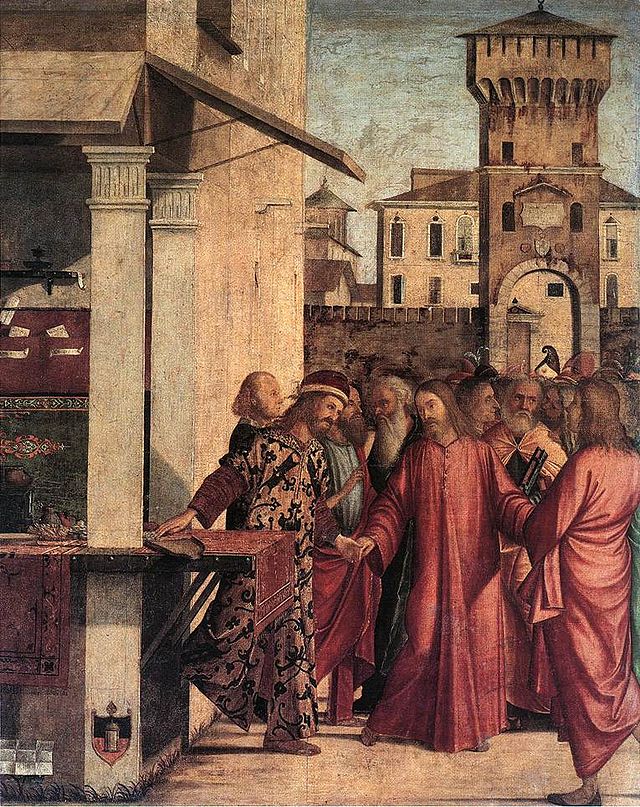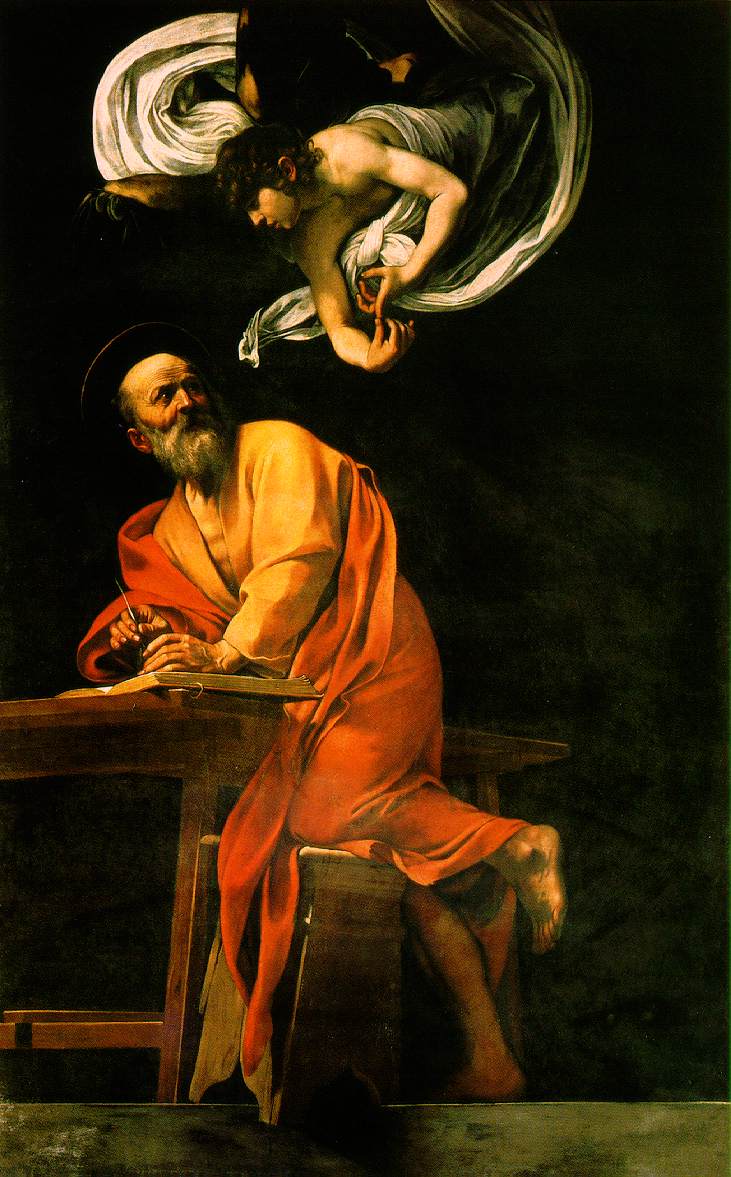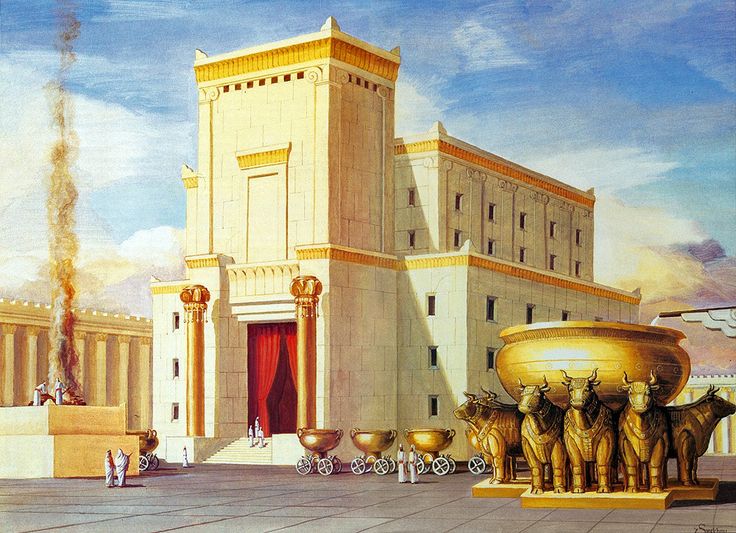Second Sunday after
Pentecost
June 11th, Year of Our + Lord 2023
Our Savior’s and Our
Redeemer Lutheran Churches
Hill City and Custer, South Dakota
Mercy for Matthew –
Matthew 9:9-13
Mercy for Matthew. Go and learn what this means, 'I desire mercy, and not sacrifice.'
Have you ever wondered why Jesus chose Matthew the tax collector to be one of the Twelve? I bet Matthew wondered. For the Savior did not call him to an easy road. Come, follow me, the Savior spoke, and I can imagine the swarm of butterflies that likely swirled in Matthew’s belly. As a tax collector for the Roman overlords of his own nation, Matthew would have understood very well what people are like.
Matthew could have been a cheat, using his position as a way to enrich himself at thepeople’s expense, like Nicodemus. Or Matthew could have been entirely scrupulous, never taking a single penny beyond what was required. I doubt this mattered much to his Jewish neighbors. Rome was going to have tax collectors, and it was better for everyone if these bureaucrats understood and even had concern for the Israelites. So all the better that a Jew should serve in this role. But no matter what, Matthew would have been hated, because he was the outward facing representative of the occupying Roman regime, seen as a traitor by many of his countrymen. Matthew would have received the worst of Israelite venom against Rome, regardless of how he did his job. Not a likely candidate to be chosen as one of the twelve foundation stones of the New Israel, the Church that Jesus built.
And yet, Jesus chose Matthew. Come, follow me.
Did the whispers and innuendos ever stop for Matthew? Hard to say. Because only the LORD forgives and forgets, Matthew’s past would have been remembered by people, even people who became Christians. Of course, as an Apostle, we know that Matthew was God’s instrument for working miracles of healing, along with teaching and preaching the resurrection victory of God’s Messiah, Jesus of Nazareth. This would have made him beloved. Nevertheless, I doubt Matthew’s lofty calling stopped the earliest Christian sinner/saints from sometimes whispering about him behind his back, or maybe to his face, casting aspersions about his dubious background.
Matthew no doubt ministered to some people
whom he had taxed. When the Apostle
Matthew had to reprove, rebuke and call sinners to repentance, as all faithful
preachers must do, it’s hard for me to imagine that some of his hearers didn’t
sometimes denigrate his authority by pointing out his prior trade, as an agent
of financial extraction for the Romans.
“Where does that tax collector get off, calling me a sinner?” I suspect that Matthew the Apostle faced some
resistance due to his career before Jesus called him. Because that’s how people are. And yet, Jesus called Matthew to follow him,
which he did. And thank God for
that!
On a human level, Matthew had talents that served him well as an Apostle. Including mad literary skills. As a 1st Century Roman government agent, he was likely quadri-lingual, knowing Latin, the language of government, Greek, the language of commerce, Aramaic, the day to day language of the Jews, and Hebrew, the language of Scripture. In any case, Matthew’s Gospel is remarkable. He knew the word of Moses and the prophets in great detail. He organized his telling of Jesus’ story to especially reflect and reference the five books of Moses. Beyond revealing Jesus to be the promised “prophet like Moses,” the new and final leader of God’s people, the first Gospel is also a clear and monumental theological treatise. Matthew gave the Early Church, and us, a blueprint for how to be Church, and a clear exposition of the teaching of Christ and His Gospel.
Certainly, Jesus also chose Matthew to prove a point, to give an living example of the remarkable good news that no human being is beyond the reach of God’s mercy. Offended that Jesus eats dinner with Matthew and other tax collectors and notorious sinners, the Pharisees did not seem to understand what the LORD had always proclaimed: God’s salvation is for all people, Jew or Gentile, outwardly pious or clearly sinful, a free gift of purification by forgiveness, a divine remaking of sinners into God’s holy ones, His saints. As Jesus said at the dinner at Matthew’s house, "Those who are well have no need of a physician, but those who are sick. [13] Go and learn what this means, 'I desire mercy, and not sacrifice.' For I came not to call the righteous, but sinners."
Now, to be sure, Jesus’ call to sinners does include the Pharisees, and all people. For we are all sinners. But if we, like the Pharisees, stubbornly cling to the idea that we are not really so bad, we would lying to ourselves, and cutting ourselves off from the only Savior. Calling Matthew the tax collector to be one of His inner circle, one of the founding Apostles of the Church, kept the amazing grace of God for all sinners front and center.
Maybe there was another reason for Jesus to call Matthew, kind of a contextual and contrasting lesson. God saved tax collectors, but God is not a tax collector. It is all too easy for us to fall into such thinking. Oh, yes, yes, we know God has set up a salvation plan through the Cross and Resurrection of Jesus. But Christians again and again fall into the error of adding extra steps to God’s completed plan. Like suggesting God also requires things of us that we must do, taxes, financial or spiritual, that we must pay, in order to be fully saved, or in order to stay on God’s good side. If you don’t pay your taxes, you will get in trouble with earthly authorities. But your God is not a tax collector.
Or, as Jesus said: Go and learn what this means: “I desire mercy, not sacrifice.”
I have always struggled to remember this truth about the Old Testament sacrificial system: it was a merciful gift. The LORD’s instruction to do all those ritual sacrifices for sin, goats and bulls and sheep and what not, that whole sacrificial system was a gift. It was not how Israel earned God’s mercy, but rather a gift, designed to create and sustain Israel’s faith in God’s mercy. It had to be a gift, because mercy that is earned is not mercy; it’s wages, salary. Something you earn is a just reward. If you’ve earned God’s favor, then there isn’t any need for mercy.
It's hard not to think of the required sacrifices of ancient Israel as works required to earn God’s favor. They were, after all, required, things God gave Israel to do. It was the Law for Israel. And yet it was also a gift. It was also Gospel, good news pointing to the coming Savior. Because the blood of bulls and goats cannot atone for human sin. The animals didn’t sin! How weird and empty would it be for salvation to be earned at their expense?No, God gave the animal sacrifices as signs of His mercy, to foreshadow the coming Sacrifice that would truly do the job. The sacrifice that is infinite divine mercy, the once for all loving sacrifice of God’s Son for the sins of the whole world. And so we begin to see what the LORD meant when He declared through Hosea: I desire mercy, not sacrifice.
Real and truly valuable sacrifice was necessary, because sin is real, an insult to God, a crime worthy of divine rejection. Sacrifice was necessary, if God and mankind were to be reconciled, brought back into a good relationship. But no creature on earth, no bull, no goat, no sheep, certainly no sinful person, was truly a worthy sacrifice. So, we see that sacrifices for sin are, by necessity, gifts from God. By His grace, true sacrifice is always a gift.
Through Moses, God did give Israel sacrifices to perform, a very strange-to-us religious system filled with the blood of bulls, goats, doves and lambs. This system was always a sign, always a foreshadowing, always looking forward to the one truly valuable sacrifice. To be sure, God used the sacrificial system to save ancient Israelites, by maintaining their faith in the coming promise, the promise of mercy, perfect mercy, poured out in the self-sacrifice of Jesus on Golgotha.
Through the greater Moses, through Jesus of Nazareth, we have also received rituals to perform. These are not done to earn God’s favor, but to receive His finished work of mercy. Go and make disciples of all nations, baptizing them in the Name of the Father and of the Son and the Holy Spirit. Perfect mercy, sinful orphans adopted as children of God. And of course: Do this in remembrance of me. That is, take eat, take drink, my Body and Blood, given and shed for you for the forgiveness of sins. Perfect mercy delivered, flowing from the mercy of God, perfected and revealed in the sacrificial Cross of Jesus. Rituals of mercy, through which we receive the blessing of that once-for-all sacrifice. We are not earning God’s favor by our performance of these rites, these commands of God we call Sacraments. No, like Matthew, we are blessed to be washed clean by God, to sit down to dinner with Jesus, to receive His perfect mercy.
We pray that God the Holy Spirit always keeps our faith clear and true, confessing that only God can do the work of salvation, and that He has done it, and that He delivers this gift to us. As Jesus had mercy on Matthew, so also He is merciful to us.
None of us are Roman tax collectors. But, like Matthew, we hear voices that point
to our past, and our present, and say we can’t possibly be pleasing to
God. We know how people can be, eager to
point fingers and cut each other down.
We know these voices, from people around us, even from supposed
friends. We know these voices because we
have made similar accusations. And they
echo in our own heads and hearts as well.
How could Matthew the tax collector really be God’s beloved? How could that sinner be part of God’s
family? How could I really be God’s child?
Know these voices for what they are: accusing lies from Satan. We shouldn’t say them, we shouldn’t listen to them, we needn’t believe them. Because Jesus’ mercy is perfect, for Matthew, and for your neighbor, and for you.
God grant us to rest in His perfect mercy, to believe in it for ourselves, and for others.And God grant us to also desire mercy, not sacrifice, in our day to day lives. For the sake of others, for the sake of those notorious sinners who need Jesus, God help us to remember that we too are notorious sinners, forgiven and restored by Jesus.
In joyful thanks to the God who has given us the merciful sacrifice that saves, God grant us to extend His mercy to others. That through us the Holy Spirit would show mercy to a world of sinners who all need Jesus. For Jesus came to call sinners, not the righteous, to heal the sin-sick, and invite them to His table, today, and forever and ever, Amen.





No comments:
Post a Comment